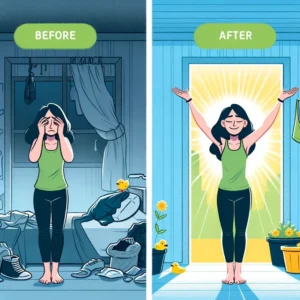Happiness. It’s one of the most sought-after human experiences, yet for many, it feels frustratingly out of reach.
We try manifesting it through career success, material possessions, and pleasurable experiences, only to find its effects fleeting at best.
But what if lasting happiness isn’t as elusive as we think?
Emerging research suggests that the key to sustainable well-being already lies within us – or more specifically, within our natural human impulse to move and be active.
Can’t believe this? Read the article!
In this article, I will show you how exercise can help you achieve lasting happiness, based on the latest scientific evidence.
Why Our Endless Pursuit of Happiness Falls Short
From flashy cars to designer clothes, modern society tempts us to believe happiness can be bought. While material possessions and status may bring short-term pleasure, study after study shows they do little to impact lasting well-being.
The truth? Our never-ending quest for happiness often centers around external factors, when the real key lies within.
As humans, we’re wired to move. Our ancestors thrived through near-constant physical exertion. Yet today, with sedan-centric lifestyles and desk-bound workdays, we find ourselves increasingly disconnected from this primal need.
Could re-embracing movement and activity be the missing ingredient to sustained happiness? Compelling new research suggests it may just be.
The Irrefutable Connection Between Exercise and Mental Wellness

Groundbreaking new studies from renowned institutions like Yale and Oxford have yielded astonishing conclusions: physical activity surpasses even money when it comes to boosting mood and mental health.
It’s a finding that flips traditional perspectives on happiness upside down. While we scramble to earn more, achieve accolades, and accumulate possessions in hopes of satisfaction, it turns out we already possess the tools for a joyful life. All that’s required is the dedication to regular exercise.
Even Light Activity Delivers Dramatic Benefits
You don’t have to train for an ultramarathon or sweat through intense CrossFit classes to reap the mood-lifting perks of exercise. Even light activities like household chores, gentle yoga, and leisurely gardening confer powerful benefits for mental health.
In a sweeping Lancet study analyzing the exercise habits of over 1.2 million Americans, participants saw significant gains in well-being from regular activity of just 30-60 minutes, 3-5 times per week. Simple pleasures like walking, dancing, and household projects had particularly strong ties to elevated mood.
But the gains weren’t limited to feel-good exercise. Competitive sports, cycling, aerobics, and gym sessions were all shown to slash periods of low mood as well. And the most active participants? They experienced 43% fewer days of sadness and hopelessness compared to inactive peers.
Moving More than Three Hours a Day? Don’t Overdo It!
While the mental health benefits of exercise are irrefutable, more isn’t necessarily better. Surprisingly, the Lancet study found those who exercised more than 3 hours daily saw diminishing returns. In some cases, mood even declined compared to non-exercisers.
This reveals an intriguing U-shaped relationship between physical activity and happiness. Regular exercise boosts our outlook significantly, but overdoing it can tip the scales in the opposite direction. The key is carving out an optimal exercise schedule that keeps your activity level consistently in the 1-3 hour range for maximum results.
As Dr. Chekroud said:
Previously, people have believed that the more exercise you do, the better your mental health, but our study suggests that this is not the case. Doing exercise more than 23 times a month, or exercising for longer than 90-minute sessions is associated with worse mental health
So while an extra 30-60 minutes of activity works wonders, tripling your gym time won’t necessarily triple your happiness. When it comes to exercise, moderation is key.
The “Magic Pill” Effect: Why Exercise Boosts Happiness
Dubbed the “magic pill” for its near-instant mood-lifting capabilities, exercise works its wonders through multiple channels. Let’s break down the science-backed mechanisms that make physical activity a fast-acting happiness booster:
1. Exercise Releases Powerful Feel-Good Chemicals
Through movement, our muscles stimulate the release of endorphins – your body’s natural opiates that generate a euphoric high. You’ve likely felt this yourself after an intense cardio class or sports game. In addition to endorphins, exercise boosts levels of serotonin, dopamine, and other chemicals linked to mood regulation and happiness.
2. Exercise Reduces Stress and Anxiety

Physical exertion provides an outlet for mental tension, allowing us to burn away worries and frustrations constructively. The deep breathing, rhythmic movements, and mental focus of exercise all help relax the body and quiet racing thoughts. In the long term, routine activity helps regulate the body’s stress response, making you more resilient to anxiety triggers.
3. Exercise Cultivates Self-Efficacy and Self-Esteem
Each workout completed gives us a sense of mastery and self-efficacy. As we grow stronger, faster, and more skillful through activity, we build physical confidence and belief in our abilities. The pride of achievement transfers over to self-esteem, fueling an uplifted outlook.
Of course, a true magic pill that could deliver exercise’s vast benefits would be worth billions. While such a drug remains fiction, adopting a more active lifestyle is within everyone’s reach. And the payoffs for happiness and mental health are just as real.
Want to Be Happier? Just Move Your Body!
Once viewed as a prerequisite mainly for physical health, exercise is now indisputably linked to emotional well-being. While money can’t buy happiness, it can certainly enable an active lifestyle filled with bicycles, gym memberships, and sports equipment.
Along with exercise, factors like college education, earning over $50,000 yearly, and maintaining a healthy BMI are also associated with more good mood days. However, no intervention studied matched the movement’s magnitude of impact.
So next time you’re feeling low or stressed, don’t waste money on a lavish purchase. Don’t dwell on what’s weighing you down either. Instead, get up and move! Even a short walk or jog can lift your spirits in minutes. While life’s external circumstances will always fluctuate, your ability to move remains constant.
Happiness starts from within. By honoring our inherent need for physical activity, we unlock lasting contentment no money can buy. Or as the sage Hippocrates once declared:
Walking is man’s best medicine.
Embrace this wisdom, and joyful days lie ahead.


